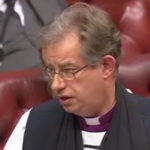I visited Greyfriars church in Reading yesterday for the 9.30 and 11.30 am services. Greyfriars are part way through a sermon series on Micah and the sermon was on passages in Micah 2 and 3.
This morning, the fourth beatitude is my way into the prophet Micah and to this passage. Jesus begins by blessing those who are poor in spirit, who know they need God; those who are tender hearted, who mourn the suffering in the world; those who are willing to be servants to others as Christ was meek. His fourth blessing is for the world changers, the godly discontents: the people who long for everything to be different, those whose passion is to change the world. His words are a glorious promise of hope:
“Blessed are those who hunger and thirst for righteousness, for they will be filled” (Matthew 5).
Micah is one of these. Perhaps you are too. Micah is someone who is able to see and hear what is wrong in the world and who has to speak out. Together with Amos and Hosea and Isaiah and others, he forges in the tiny kingdom of Judah the concepts of justice which underpin the entire civilised world today. Whenever the world talk about human rights or equality or oppression or the needs of the poor or the corruptions of power, we are using some of the language first minted by Micah. His eyes see what is wrong and his words name it. He is a godly discontent, a prophet.
Today’s passage highlights the injustice Micah sees in what is a basically a city state but a microcosm of the human condition. He sees and names the evil of the landlords and money lenders who foreclose on the poor for their own gain and steal their land away. He pictures them lying awake at night longing for this desirable vineyard or that beautiful house and planning how to acquire it. Then he tells us that they wake up the next day and set out to do the very evil they have planned. There are loan sharks aplenty preying on the poor of Reading. We have been painfully reminded recently of the dangers of landlords who do not pay attention to health and safety.
He describes gang warfare and violence against those who are doing no harm. Knife and gun crime is on the rise again, particularly in London: “You strip the robe from the peaceful, from those who pass by trustingly with no thought of violence”.
He sees and he describes the oppression of women and evil done to children: crimes in themselves but crimes which are a particular abuse of power. It’s not hard to make the connection, sadly, with our contemporary world and with some of the news this week. These evils have not gone away:
“The women of my people you drive out from their pleasant homes; from their young children you take away my glory for ever”.
“Arise and go; for this is no place to rest because of uncleanness that destroys”.
The original language is immensely strong here. The community is defiled because of these things. There is an immense and corrosive corruption and sickness in society.
In Micah 3, the prophet turns his fire on the entire governing class who turn away, who see no need for change, who choose not to see what Micah sees.
“Hear this you rulers of the house of Jacob, and chiefs of the house of Israel, who abhor justice and pervert all equity, who build Zion with blood and Jerusalem with wrong”.
Justice is perverted because of money. The entire ruling class has been corrupted.
“Its rulers give judgement for a bribe; its priests teach for a price; its prophets give oracles for money”.
Together they still claim a veneer of religious respectability: “Yet they lean upon the Lord and say, “Surely the Lord is with us! No harm shall come upon us”.
But it is Micah’s role to see what he sees and then to pronounce sentence:
“Therefore because of you, Zion shall be ploughed as a field; Jerusalem shall become a heap of ruins and the mountain of the house, where the temple is, a wooded height”.
“Blessed are those who hunger and thirst for righteousness, for they will be filled”
How are we to read and explore the prophet Micah today. What are we to learn?
First I think we are called as a church to cherish and listen the people in our community who see what is wrong and become angry about it and long for it to be set right: the prophets in our midst.
We are the body of Christ. We know we do not all have the same gifts. No single Christian exhibits all the qualities commended in the beatitudes. The only person who has ever done so is the person who gives the Sermon on the Mount: Jesus Christ.
But God gives to every church those who are hungry and thirsty for righteousness: those who will see the suffering of the poor; or the abused; or the homeless; those who see what climate change is doing to our planet; those who share the pain of victims of domestic violence or sexual exploitation; those who stand with asylum seekers and refugees.
Prophets in our midst are uncomfortable. Micah found that people did not want to listen to him. “One should not preach of such things” the people say to him. Tell us something more comfortable, something that will make us smile or feel good.
We have a harder calling. Our calling as a Church is to welcome the prophets in our midst and give them space. And then to respond where we can through service and advocacy and campaigning for change. Our calling as a church is to harness the vision of the prophet to the practical skills of the administrator and the generosity of the person who has wealth and the gifts of the communicator.
People with these gifts do not get everything right. They have at the core of their being a hunger and thirst for the world to be better. But those of us who have other gifts need to think very carefully when they begin to make us uncomfortable. It is all too easy to close our eyes and ears. We need the witness of Micah to remind us of that.
Together we are called to make a difference in our local community and in the world and the only way to do that is as we work together as a team. Cherish your prophets and listen to them.
But here is the second lesson. Micah does not yet have the complete picture. He sees the purposes of God, in Paul’s words, through a glass darkly.
He is given a kind of x-ray vision to see into the hearts of those around him and name the evil. He sees the judgement that is coming. He sees even beyond the judgement to restoration. He sees a way of life which is satisfying and good: to do justice and love kindness and walk humbly with your God (6.8).
But he cannot yet see the cross. He sees the weakness of temple worship: animal sacrifice and even human sacrifice cannot make a difference to the human condition, to setting things right, to transformation.
But he cannot yet see that God’s own Son will take human flesh and live a perfect and complete life and offer his life on the cross. He cannot yet see that in the death of Jesus Christ on the cross is the gift which enables forgiveness and transformation and new beginnings. He cannot yet see the possibility of human hearts being changed and made new.
He cannot yet see baptism: the outward washing and cleansing and making new so that the most corrupt life can be restored and made new. He cannot yet see that that the goodness and healing in the cross will flow outwards through the people of God for the remaking of all humanity and of all creation: the reconciliation of all things.
The more clearly we see the corruption and deceit of the world, the more fully we know the deceitfulness of our own hearts, the more bleak our vision of the true state of the world, the more we need to see and hold onto the message of the cross.
Micah cannot yet see the gospel and the message of hope and transformation which Christ brings and makes possible. Whatever we have done, however corrupt and far from God we have been, however we have suffered, it is possible to begin again, to make a new beginning with God, to find a way to inner healing and peace and to be restored.
As the Church we are custodians of the gospel. We must never make it less than Micah intends. We must never reduce it to a gospel simply of personal, individual salvation. The gospel is good news for the whole earth and at its heart is a vision of God’s justice and God’s peace for the whole of creation.
But we must understand that the heart of our faith, the whole gospel, is even more than Micah’s vision: the restoration and healing of creation, the salvation and making new of individuals and families and communities, the restoration of the earth.
We are called together to be a more Christ like Church, embodying and living out this gospel in a way which is contemplative, compassionate and courageous.
“Blessed are those who hunger and thirst for righteousness, for they will be filled”
A sermon at Greyfriars, Reading
5th November, 2017
Micah 2.1-2; 6-11; 3:9-12 (part of a series on Micah)


